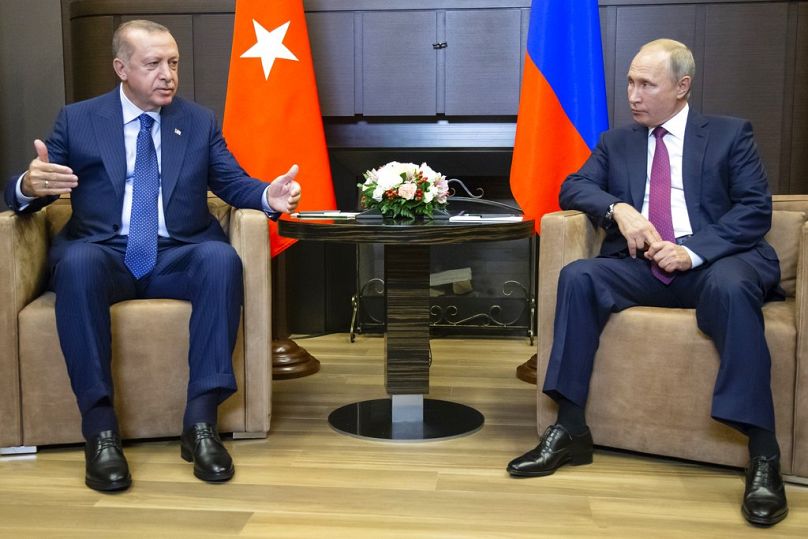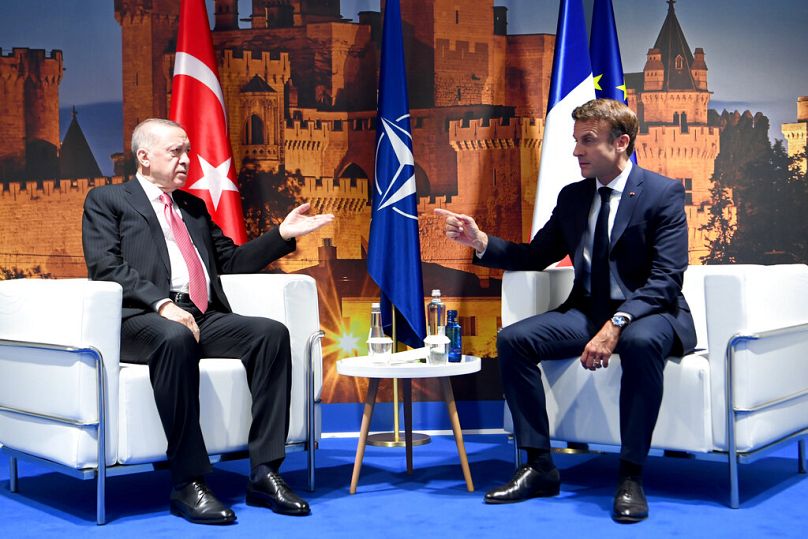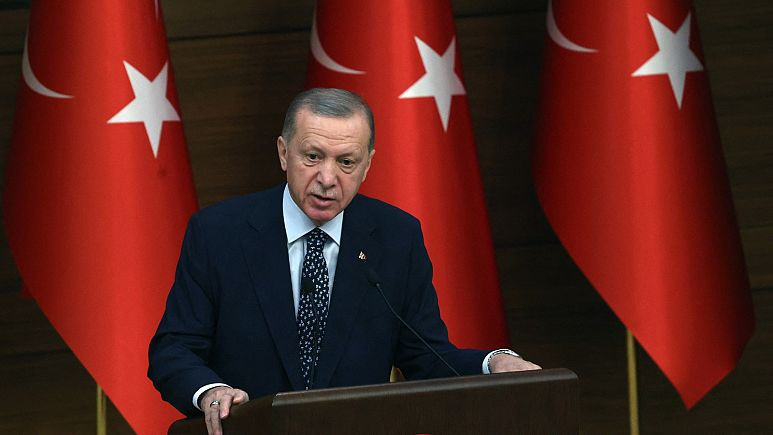Turkey has been walking a tightrope between Ukraine and Russia, trying not to harm the relations it has with both countries.
So how did we get here, and is it a viable long term strategy for Ankara?
Less than two weeks into the Russian invasion of Ukraine, on 10 March last year, Turkey entered the stage to play a mediator role between the countries, but the meetings held at foreign minister level in Antalya left participants empty-handed.
A few more attempts were made in the following days, including talks held in Istanbul, which were praised as “significant” at the time, by Turkey’s Foreign Minister Mevlut Cavusoglu.
Peace talks that bore little fruit halted on 17 May when Kyiv withdrew from the negotiation process.
A beacon of hope was lit last July when Russia agreed on an initiative brokered by the UN and Turkey on exporting grain from the Black Sea. The deal is due to expire on 18 March but unless there is a formal objection from either side, the grain export deal will continue.
Dr Ali Bilgic, an associate professor at Loughborough University says Turkey has a unique position in the Ukraine war given its long-standing good relations with both parties.
“Russia has been an important economic partner of Turkey, which has had trade relations with Ukraine as well. Turkey was an important soft power in Ukraine before the war too,” he tells Euronews.
Growing trade relations with Russia
Trying to reconcile the two sides during the course of the war, Turkish President Recep Tayyip Erdogan expanded the existing cooperation in the energy sector with his Russian counterpart Vladimir Putin.
At the same time, leaders also talked about turning Turkey into a “gas hub” to export gas to Europe; while Russian President Vladimir Putin said he may consider Turkey as a transit country for a possible future gas pipeline.
As ties got closer, concern amongst opposition in Turkey grew. Questions have been asked repeatedly in the Turkish press: would this friendship open a path for Russian manipulation of the Turkish elections in favour of Erdogan?
“Turkey’s trade relations with Moscow were already at a peak, against the backdrop of a series of sanctions imposed on Russia from the US and the EU,” says Professor Bilgic.
According to the Turkish Statistical Institute (TUIK), Turkey doubled its trade volume when imports from Russia rose to $58.85 billion (€55.44 billion) in 2022 – that’s up from from $28.96 (€27.28 billion) billion the previous year.
Dr Bilgic said that Ankara and Moscow have also often cooperated in Syria since 2015.
“Needless to say, Turkey has deep political, economic, and military relations with the West. It is quite difficult to find a state like Turkey, and Ankara has been using this unique position quite effectively”.
While Erdogan and his ‘dear friend’ Putin, were shaking hands on financial deals, Ankara continued backing Kyiv in the political arena and was one of the first to provide much needed humanitarian aid.
Turkish defence firm Baykar Tech have sold and donated drones to Ukraine and is planning to complete the construction of its manufacturing plant in the country within two years.
Turkey also sought to avoid an escalation by shutting down the straits that lead to the Black Sea, with the authority granted by the Montreux Convention.
“Warships would be blocked from accessing the Bosphorus and Dardanelles straits, whether they come from countries bordering the Black Sea or not,” Foreign Minister Mevlut Cavusoglu announced in March 2022.
According to Dr Bilgic, the three countries are dependent on each other:
“Russia needs Turkey because, through Turkey, Moscow breaks its international isolation while keeping up economic relations with Turkey, ” explains Dr Bilgic.
“Ukraine needs Turkey militarily. But Turkey needs both Russia and Ukraine as well. In the case of Russia, Turkish exports have filled the gap created by international sanctions to a certain extent and this works for Ankara as the country’s economy has been in significant decline in the last few years”.
“In the case of Ukraine, Turkey sees the advantage of Ukraine as an obstacle to the Russian military build-up in the Black Sea region,” he adds.

But what about the West?
Turkey has preserved its stance by not joining the sanctions imposed on Russia by the EU and US, taking a step further also obstructed NATO’s possible expansion with bids from Sweden and Finland.
Despite this, the West did not turn its back to Turkey completely because, according to Dr Bilgic, “it also needs Turkey”.
“Since the beginning of the war, China has been trying to adopt a mediator role in the conflict and Beijing’s efforts have been intensified recently. Particularly for Washington, this role is not acceptable given the rising tension with China. Turkey as a NATO state is a preferred option,” he argues.
On the other hand, Erdogan’s willingness to push relationships to the limits has not been completely without consequences.
Dr Bilgic says the main loss has been economic, but there is also reputational damage in the West from continuing to block Swedish and Finnish NATO bids.
At this point, says Bilgic, Western capitals are not questioning Turkey’s value politically, strategically, militarily or economically for the West, but there are some voices starting to question Turkey’s position in NATO.

What’s still in it for Turkey?
According to Dr Bilgic, Turkey has won two main points with its ongoing diplomatic balancing act betwen Russia, Ukraine and the West.
Firstly, he says that Turkey has “put its name on the map as a defence exporter” after investing heavily in the defence industry for a decade — and the Ukraine war has shown the rest of the world that Turkish weapons can be very effective.
“Secondly,” says Bilgic, “Ankara has managed to show to the Global South countries that Turkey does not necessarily follow the West and can have an independent foreign policy”.
So how long can Turkey walk on this tightrope without falling off? That remains the biggest question.
“The main risk for Turkey is that if the fight is intensified and Russia starts making gains, the patience for Turkey’s balancing act in the Western capitals might run out,” Dr Bilgic argues.
“Ankara might feel pressure to join the international sanctions. This can significantly disturb Ankara’s position in the war”.
Source : EuroNews


